- europages
- >
- COMPANIES - SUPPLIERS - SERVICE PROVIDERS
- >
- plant construction
Results for
Plant construction - Import export
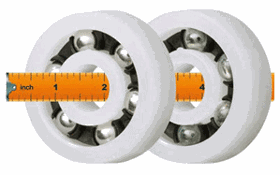
IGUS® GMBH
Germany
inch sizes The inch dimensions are finding their way into the range of xirodur® B180 polymer ball bearings! In combination with the PA cage and either glass or stainless steel balls, they offer a long service life and excellent value for money. They can be used in up to 80°C, are corrosion resistant and free from maintenance and lubricants. Nonmagnetic and washable Corrossion-resistant Predictable service life Lightweight Electrically insulating Application areas:Medical technology, plant construction, cleanroom technology, materials handling inch sizes The inch dimensions are finding their way into the range of xirodur® B180 polymer ball bearings! In combination with the PA cage and either glass or stainless steel balls, they offer a long service life and excellent value for money. They can be used in up to 80°C, are corrosion resistant and free from maintenance and lubricants. Nonmagnetic and washable Corrossion-resistant Predictable service life Lightweight Electrically insulating Application areas:Medical technology, plant construction, cleanroom technology, materials handling
Request for a quote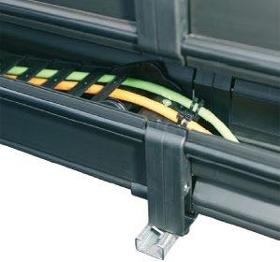
IGUS® GMBH
Germany
Safe energy and data transmission The igus® Chainflex® cable range offers a choice of over 850 different cables, available from stock. A main focus of the range are the data and bus cables. Solutions based on copper, glass or plastic fiber optic cables are provided for almost all bus systems in industrial use. We continue to provide you with all supply cables for your drive systems such as motor cables with and without brake/tacho cables and the matching feed cables. Ready assembled with plugs and sockets on request. Cost-reducing assembly The use of pre-assembled E-ChainSystems® enables expensive assembly hours at the place of installation to be considerably reduced. Functionally tested systems guarantee that plant components are soon put into operation. Assembly service We would be pleased to send you an offer for complete solutions, including all assembly services. You do not tie up your own resources and you have a trouble-free energy supply system for the future at a fixed price. LBT FLIZZ® - High speeds and accelerations Travel distances up to 120m, travel speed up to 8 m/s Suitable for moving or stationary controls, ideal for all bus systems When light weight is required When quiet, maintenance-free operation is required When rust-proof property is required At -10°C to +60°C constant temperature At accelerations over 10 m/s² Energy supply system for all media, not only electrical Also suitable for outdoor use (with reduced load data) Your benefit from LBT FLIZZ® Guaranteed service life Cost-effective compared with conventional energy supply systems Cable protected against dirt, rain, sun, ice, snow and leaves Insensitive to wind and motion Good resistance to chemicals, solvents, etc. Use of special cables possible, e.g. servo drive cables, fiber optic cables, bus systems etc. almost maintenance free Quick and easy installation due to delivery as a ready-assembled system Easy integration with existing plants Cable length 50% of the travel distance No central cable junction No effort required to maintain carriages Sewage treatment plant Longitudinal scrapers Sand traps Rain water overflow reservoir Galvanizing equipment Cranes Plant construction Space-saving and compact energy supply with LBT FLIZZ® - low maintenance system, delivered pre-fitted with ready-assembled igus® E-Chain Energy supply system protected from wind and weathering. The used materials are weather-resistant, as well as resistant against most chemicals, oils, fats, coolants and solvents Solid plastic with powder-coated support tubes Modular assembly: the system can be enclosed with intermediate panels! Can be delivered pre-fitted Variable fields, which are simply screwed on top of each other Glide rail integrated in the profile
Request for a quote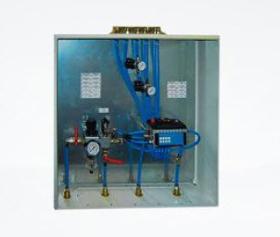
CIC - KLAUS CZERWONKA
Germany
control panels, control cabinets, pneumatic systems, pneumatic systems, control units, pre-assembled pneumatic modules for machines and plants in automation technology factory automation assembly lines test benches Also for automotive applications such as brake test benches, assembly robots, conveyor belts. Design, layout, assembly, plug and play delivery. We are also happy to use components according to the parts list, specifications or customer specifications.
Request for a quote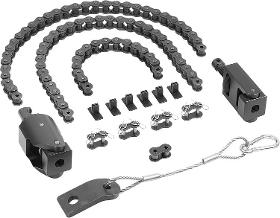
NORELEM FRANCE
France
Chain clamps are used mainly in machine and plant construction. Chain clamps enable cylindrical, complicated and large to very large workpieces to be clamped securely and effectively in the quickest and easiest way. Suitable for cylindrical workpieces, valve bodies, pistons etc. The workpiece surface can be protected by attaching the plastic elements. Application: The knurled nut on the clamping bracket can be used to preset the chain length and the clamping force. The required torque is set on the clamping hook. Accessory: Steel roller chains for chain clamp sets 04211-03. Steel turnbuckles for chain clamp sets 04211-06. Steel prisms for chain clamp sets 04211-09. Nuts for T-slots DIN 508 enhanced, 07060. Cap screws DIN EN ISO 4762, 07160. Note: The opening angle of the chain should not exceed 30°. Do not exceed max. permitted tightening torques. Supplied with Chain clamp set 04211-15: Clamping hook. Clamping bracket.
Request for a quote
MEBA STEEL & INDUSTRIAL SUPPLIES TRADE GMBH
Germany
We supply the pipes that are suitable for bending and are used for the constructions of plants and equipment subject to high temperatures and pressures. The seamless pipes, hot rolled or cold drawn/cold finished with heat treatment. The ASTM A335/ASME SA335 and EN 10216-2 norms require heat treatment also for the hot rolled pipes. The welded pipes are manufactured according to EN 10217-2. Supply of pipes suitable for high temperatures are according to; ASTM A 106 / ASME SA 106 (Seamless pipes) ASTM A 335 / ASME SA 335 (Seamless pipes) EN 10216-2 (Seamless pipes) EN 10217-2 (Welded pipes)
Request for a quote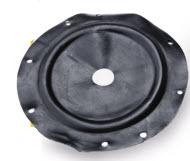
HEMOGUM
Serbia
Are you planning to have chemicaly resistant protection of tanks for a plant or a construction? Or would you like to improve the existing protection measures? You can contact Hemogum to manually restore worn-out pipelines with rubber coating, tanks, rotors and pump stators that will thus be protected against aggressive substances. We make rubber foils as protection coating for industrial vessels and tanks as anti-corrosion protection from aggressive fluids and wear particles. Quality, hardness and thickness of the foil is determined by the chemical composure of the working media, size of particles, concentration, temperature and flow rate.
Request for a quote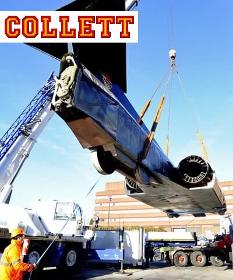
COLLETT & SONS LTD
United Kingdom
> Click on the "WEBSITE" link for more > Under the Construction Plant-Hire Association (CPA) crane rental conditions the client is responsible for supplying all necessary lift plans, Appointed Persons (APs), Slingers, Banksmen and insurance. On behalf of our clients, and with our established crane supplier relationships, we can provide mobile crane hire on a rental basis as an integrated package with our transport operations. Alternatively these crane hire services can be provided in conjunction with our contract lift services as outlines above offering a complete solution. Whether it's manoeuvring machinery within a confined space, loading heavy cargo to an awaiting vessel, relocating transformers or positioning loads, our Team, utilising our jacking & skidding, crane hire and industrial services can provide an integrated solution.
Request for a quote
DE SMET ENGINEERS & CONTRACTORS
Belgium
Thanks to its own sugar know-how, DSEC specialized in sugar plants EPC construction. The company acquired its expertise through the realization of many projects, ranging from audits of existing installations up to the turnkey construction of new industrial complexes. As for its other activities, DSEC is able to execute sugar related projects under the form of full EPC contracts, being familiar with all aspects of the project's implementation. DSEC not only masters specific sugar techniques and technologies but also all related process auxiliaries, civil works, steel structures, installation works, start-up and commissioning activities, including training of the client's personnel. DSEC’s project design and construction management gives paramount importance to the respect of health and safety and environment norms as well as to technical efficiency and ease of operation. The monitoring of project cost, time schedule and performances is the essence of any EPCM or EPC commitment. DSEC has developed proprietary technological and thermodynamic programs that very accurately simulate the operation of plants, from overall Heat & Mass Balances down to unitary process operations. In terms of drawings, DSEC uses a powerful 3D drawing and construction management tool (SmartPlan®) that dramatically improves material purchasing activity and site installation efficiency through a high level of prefabrication works. The importance of cogeneration and energy saving concepts has deeply changed the design of sugar plants construction and refineries over the last thirty years. DSEC is particularly proud of the results obtained in plants that have been built or upgraded in accordance with its studies and recommendations. DSEC’s independence from equipment suppliers and technology providers allows selecting the best possible technical solutions with a view of optimizing performances, energy recovery, maintenance and cost to the benefit of any project. In addition to state-of-the-art projects, DSEC’s engineering skills combined with agro process know-how have been selected by major players for developing large scale industrial units from laboratory developments and pilot plants. The projected increase in world sugar demand of 100 million tons over the next 15 years makes De Smet Engineers & Contractor’s knowhow in sugar plants EPC construction extremely valuable for the market.
Request for a quote
DE SMET ENGINEERS & CONTRACTORS
Belgium
DSEC has been active in biodiesel production EPC as an alternative for the production of biofuels. Our company favors biodiesel production because it's a biodegradable, non-toxic, produced from renewable resources (vegetable oils, recycled or fatty frying oils animal) and that contains no petroleum product but which can be used to replace petroleum diesel in diesel engines. It can be used pure 100% (B100) as fuel replacement but it is used more often mixed with petrodiesel in concentrations of 2% (B2), 5% (B5) and 10% (B10). Unlike some other biofuels, it requires no modification or adjustment, either at the level of the engine, components of the system of power or fuel storage system. De Smet Engineers & Contractors was able to extend its activities from Edible Oils & Fats to the biodiesel plants construction as a logical evolution for Vegetable Oils processing, offering the same quality and dedication with a range of services starting with Engineering & technical assistance to full turnkey projects (EPC) or EPCM commitments.
Request for a quote
DE SMET ENGINEERS & CONTRACTORS
Belgium
Through its heritage from Mr. Jean-Albert De Smet, inventor of the De Smet continuous counter-current solvent extractor, De Smet Engineers & Contractors has continued to work closely with the edible oil production sector, offering the integration of all processing units and related auxiliaries from seed storage to refined oil packaging. DSEC’s understanding of vegetable oil techniques provides a unique background for the implementation of a comprehensive project, being with its definition, its construction or its operation. Edible Oils Plants construction requires a deep specialization that De Smet Engineers & Contractors processes over years of experience in projects implementation around the world and a very capable team of engineers that masters every detail of Edible Oil Production as well as all the technical capabilities required. DSEC´s Contracting Services offers the client a wide variety of contractual setups from Conceptual Engineering, Front End Engineering Design (FEED) to Full Turnkey (EPC) or EPCM to adapt to every client needs.
Request for a quote
DE SMET ENGINEERS & CONTRACTORS
Belgium
Ethanol production plants construction requires a deep specialization that De Smet Engineers & Contractors processes over years of experience in projects implementation around the world and a very capable team of engineers that masters every detail of this business as well as all the technical capabilities required. In the same way it extended its activities from oil to biodiesel some years ago, De Smet Engineers & Contractors also identified bioethanol projects as a logical development of its general contracting activities where its sugar engineering experience was of utmost importance. The company has so far undertaken the construction of complete fuel ethanol plants using both cereals and sugarcane as feedstock. DSEC´s Contracting Services offers the client a wide variety of contractual setups from Conceptual Engineering, Front End Engineering Design (FEED) to Full Turnkey (EPC) or EPCM to adapt to every client needs.
Request for a quote
DE SMET ENGINEERS & CONTRACTORS
Belgium
The Semi Turnkey set-up is a Partial EPC contract whereby the investor procures directly some packages and services if it is felt by him to be more cost effective and presenting a level risk that he can control. De Smet Engineers & Contractor can nevertheless retain the overall assignment management and provide engineering, documentation and advisory services for all activities undertaken by the investor under an EPCM commitment. The Partial EPC contract can be applied for the construction of industrial plants in any of the main Sectors of Activities where DSEC offers its services like the following: Sugar Production & Refining Bio-Ethanol Production Biochemical Production Edible Oils & Fats Processing Bio-Diesel Production Biomass to Energy facilities To adapt to the needs of every client, in addition to the Semi Turnkey Construction DSEC offers different contractual alternatives: FEED, Pre-Engineering, Audits and Conceptual Engineering For & On Behalf Management EPCM and EPCM+® Full Turnkey (EPC) Construction
Request for a quote
DE SMET ENGINEERS & CONTRACTORS
Belgium
DSEC's commitment on the construction of Biodiesel plants is based on a very specialized technical knowledge of the Biofuels production processes; in this article you will find a more detailed understanding about the process of Methanol Rectification and Glycerin Purification. Methanol Rectification The methanol coming from the upstream process units is fed to the rectification column. The methanol is recycled to reactor loop circuits.
Request for a quote
DE SMET ENGINEERS & CONTRACTORS
Belgium
DSEC's commitment on the construction of Bioethanol plants is based on a very specialized technical knowledge of the Ethanol production processes; in this article you will find a more detailed understanding about the Downstream Process. The alcohol in the fermented mash is then concentrated by means of distillation and rectification, before the required water content of ethanol is regulated in the dewatering process. The accrued residues from distillation, the so-called stillage, is first evaporated and then dried to animal feed, the so-called DDGS. However, the production (drying) of DDGS requires a considerable amount of primary energy (e.g. fuel oil or natural gas); therefore, if feedlots are nearby, animal feed will be sold in wet condition, so called WDGS. For sugar cane and molasses the residue, so called vinasses, was returned to the fields as fertilizer- due to sustainability reasons and change in legislation, spraying of vinasses on the fields is mostly forbidden in the meantime. In the past, direct combustion of DDGS turned out to be unfeasible because of procedural difficulties and lacking efficiency (due to the high water content of the stillage). The realisation of a biogas plant could not be achieved in large scale so far because of the enormous quantities of stillage and their high organic stress. Combination of ethanol production with biogas respectively, biomass burning results in different biorefinery concepts or so called next generation technology.
Request for a quote
DE SMET ENGINEERS & CONTRACTORS
Belgium
DSEC's commitment on the construction of Bioethanol plants is based on a very specialized technical knowledge of the Ethanol production processes; in this article you will find a more detailed understanding about the Upstream process. In Europe and the US, the existing traditional 1" generation bioethanol plants typically process cereals (maize/corn, wheat, rye, ...) and other starch or sugar containing raw materials (e.g. sugar beet). The raw material initially undergoes crushing (milling for cereals) to reduce the particle size distribution to such a degree that the enzymes enter in contact with the starch molecules in the subsequent steps. During liquefaction with alpha-amylase, starch is dismantled into low molecular sugar units, the so-called dextrines. In the next process step, saccharification, these dextrines are further dismantled into fermentable sugars by means of gluco-amylase. In the fermentation process, these fermentable sugars are partly aerobically transformed, but mainly anaerobically by Saccharomyces cerevisiae (yeast) into biomass and ethanol; sugar containing raw material as e.g. sugar cane can be directly fed into fermentation after crushing. Upstream process groups: - Storage - Cleaning - Milling / Crushing - Mashing - Liquefaction - Saccharification - Fermentation (batch or continuous)
Request for a quote
DE SMET ENGINEERS & CONTRACTORS
Belgium
DSEC's commitment on the construction of Bioethanol plants is based on a very specialized technical knowledge of the Ethanol production processes; in this article you will find a more detailed understanding about the process of Cellulosic biomass. Cellulosic biomass is the structural portion of plants and includes agricultural (e.g. Corn Stover, which is the entire above-ground portion of the corn plant, excluding the grain) and forestry (e.g. sawdust) residues, major fractions of municipal solid waste (waste paper and yard waste), and herbaceous (e.g. switch grass) and woody (e.g. poplar) crops grown as energy resources. Although distinctive in outward appearance, these materials all comprise about 40-50 % cellulose and 20-30 % hemicelluloses, with lesser amounts of lignin and other compounds, such as sugars, oils and minerals. Cellulose is a polymer of cellobiose (glucose-glucose) sugar molecules that are physically linked together in a crystalline structure to provide structural support for plants. Within these micro fibrils cellulose is found in two forms, namely amorphous and crystalline. The crystalline form of cellulose is particularly difficult to degrade and typically makes up the core of a lignocellulosic microfibril.
Request for a quote
DE SMET ENGINEERS & CONTRACTORS
Belgium
DSEC's commitment on the construction of Biodiesel plants is based on a very specialized technical knowledge of the Biofuels production processes; in this article you will find a more detailed understanding about the process of Methylester and Glycerin Production. Transesterification The transesterification reaction is accomplished in continuous, using reactors in series operating under mild conditions. The raw material is dried in flash chamber and then is continuously fed to the first reaction loop. Catalyst is continuously dosed. The Methanol is fed to the reaction unit in a proper excess. The separate glycerin is rich in soap and is directly sent to the glycerin treatment. The light phase outgoing from the head of the first reaction loop is transferred to the second reaction loop after the addition of fresh methanol and catalyst. The light phase coming from the top of the second reactor is transferred to the third reactor with addition of methanol and catalyst. The third transesterification reactor is a stirred vessel. The glycerin separated at the bottom of the second separator, relatively rich in methanol and catalyst, is recycled to the transesterification unit. The reaction mixture leaving from the third reactor containing the product (Methylester), the excess of methanol and the glycerin (reaction by-product) and a limited amount of soaps is sent to the Methylester purification section.
Request for a quoteDo you sell or make similar products?
Sign up to europages and have your products listed
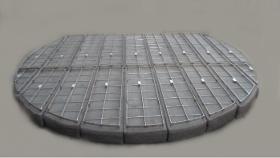
NOCKERS ENGINEERING PRODUCTS
South Africa
Wire mesh demisters/ mist eliminators are used in vertical column vessels to strip liquid particles from process flows, flue gases, exhaust air and steam. They're commonly incorporated into absorbers/ seawater desalination plants / washers / Sulphuric acid plants, to name a few. Construction is in a variety of metal and plastic materials, or combinations of them, to cope with the demands of temperature and/or corrosive environmental conditions as well as different density fluids in the gas stream. Mist eliminators are made to customer specification. Please contact us for more details. Please visit our website or contact us for more information on this product.
Request for a quoteResults for
Plant construction - Import exportNumber of results
19 ProductsCompany type